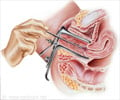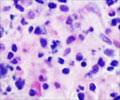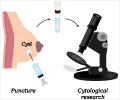
"There is currently no diagnostic test for Parkinson's disease," says study author Charles Adler, neurologist with Mayo Clinic in Arizona, US.
"We have previously shown in autopsies of Parkinson's patients that the abnormal proteins associated with Parkinson's are consistently found in the submandibular saliva glands, found under the lower jaw," adds Adler.
"Making a diagnosis in living patients is a big step forward in our effort to understand and better treat patients," says Adler, according to a Mayo Clinic statement.
The study involved a group of people averaging 68 years who had Parkinson's for an average of 12 years. They had responded to Parkinson's medication and would not have known saliva gland disorders.
Biopsies were taken of two different saliva glands: the submandibular gland and the minor saliva glands in the lower lip.
Advertisement
"This procedure will provide a much more accurate diagnosis of Parkinson's disease than what is now available," Beach says.
Advertisement
The abnormal Parkinson's protein was detected in nine of the 11 patients who had enough tissue to study. Although Parkinson's disease can't be cured, medications may markedly improve symptoms.
These findings will be presented at the American Academy of Neurology's annual meeting in San Diego in March.
Source-IANS















